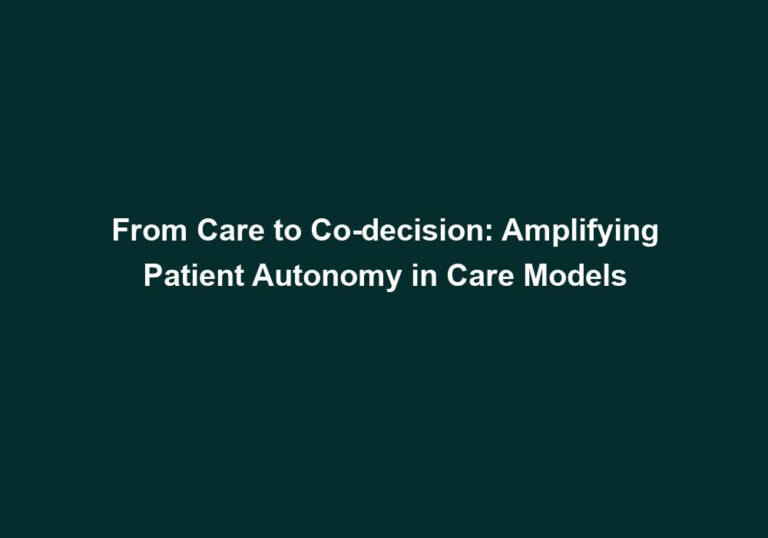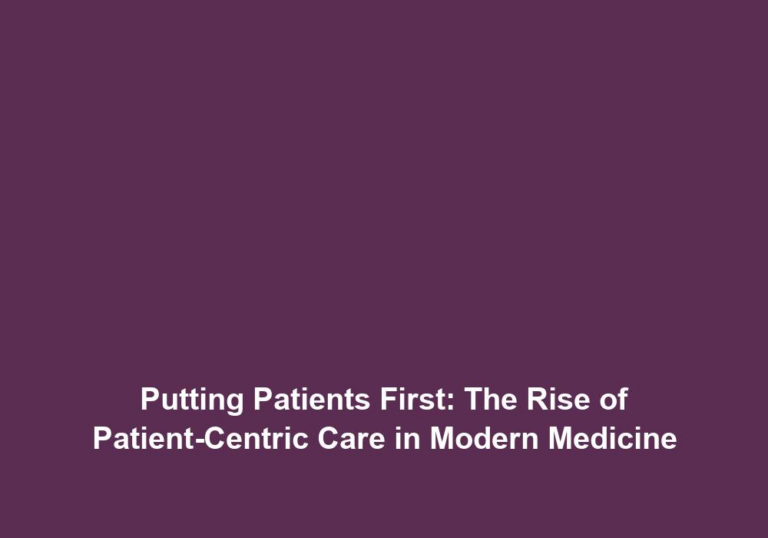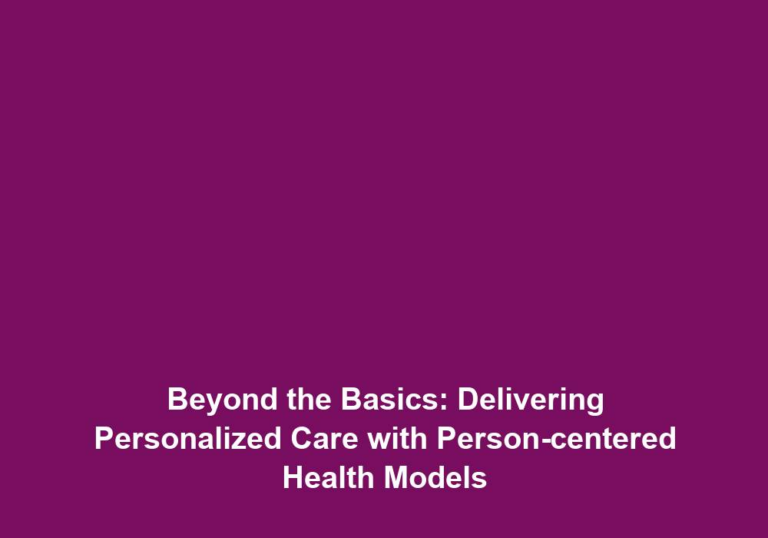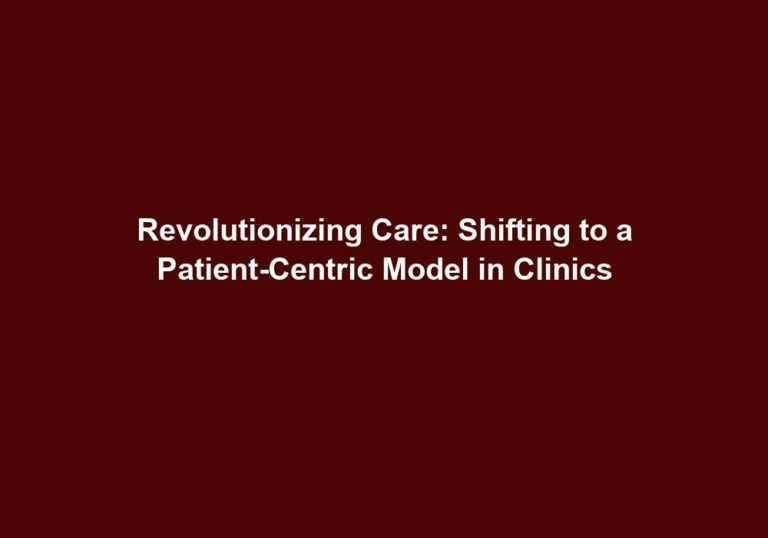Beyond the Basics: Delivering Personalized Care with Person-centered Health Models
In today’s rapidly evolving healthcare landscape, there is a growing recognition of the importance of delivering personalized care to individuals. Traditional healthcare models often focus on treating diseases or symptoms, but the concept of person-centered health models goes beyond that. It emphasizes the individual as a whole, taking into consideration their unique needs, preferences, and goals. By adopting person-centered health models, healthcare providers can truly transform the way they care for their patients, leading to improved outcomes and enhanced patient satisfaction.
Understanding Person-centered Health Models
Person-centered health models prioritize the individual’s values, beliefs, preferences, and goals in healthcare decision-making. It recognizes that individuals are unique and complex beings, and that their healthcare needs and goals may differ from others. Instead of solely focusing on the disease or ailment, person-centered care takes into consideration the individual’s physical, emotional, and social well-being.
Person-centered health models are built on the foundation of personalized care, which involves tailoring healthcare services to meet the specific needs of each individual. It goes beyond simply treating the symptoms or disease, but rather focuses on understanding the person as a whole. This means considering their values, beliefs, preferences, and goals when making healthcare decisions. By taking a person-centered approach, healthcare providers can ensure that patients feel seen, heard, and understood, leading to better overall care and outcomes.
The Benefits of Person-centered Care
- Enhanced Patient Satisfaction: By actively involving patients in their care decisions, person-centered health models empower individuals to take ownership of their health. This leads to increased patient satisfaction as they feel heard, respected, and involved in their care plans.
The patient satisfaction is a crucial aspect of healthcare delivery. When patients feel valued and involved in their care, they are more likely to have a positive experience and feel satisfied with the services received. Person-centered care allows patients to actively participate in their treatment decisions, ensuring that their preferences and goals are taken into account. This collaborative approach fosters a sense of trust and respect between healthcare providers and patients, leading to improved patient satisfaction.
- Improved Health Outcomes: Person-centered care encourages healthcare providers to consider the individual’s overall well-being. By considering their preferences, beliefs, and goals, healthcare professionals can tailor treatment plans that align with the individual’s values, increasing the likelihood of better health outcomes.
When healthcare providers take a person-centered approach, they are better able to understand the unique needs and goals of each individual. This allows them to develop personalized treatment plans that are more likely to be effective in improving health outcomes. By considering factors such as the patient’s preferences, beliefs, and goals, healthcare providers can ensure that the treatment plan aligns with the individual’s values and motivations, increasing their commitment to the plan and ultimately leading to better health outcomes.
- Increased Adherence to Treatment: When individuals feel valued and involved in their care, they are more likely to adhere to treatment plans. Person-centered care enhances patient engagement and promotes shared decision-making, resulting in improved treatment adherence.
One of the challenges in healthcare is ensuring that patients adhere to their treatment plans. Non-adherence to treatment can have negative consequences on health outcomes and overall patient well-being. Person-centered care addresses this challenge by actively involving patients in their care decisions and providing them with the necessary information and support to understand and commit to their treatment plans. When patients feel valued and empowered in their healthcare journey, they are more likely to follow through with the recommended treatments and interventions, leading to improved adherence and better health outcomes.
- Better Communication and Trust: Person-centered health models foster open and honest communication between patients and healthcare providers. This leads to the development of trustful and collaborative relationships, essential for effective healthcare delivery.
Effective communication is at the core of person-centered care. By promoting open and honest dialogue between healthcare providers and patients, person-centered health models create an environment where patients feel comfortable expressing their concerns, asking questions, and actively participating in their care. This open communication fosters trust between healthcare providers and patients, leading to stronger relationships and a deeper understanding of the individual’s needs and goals. Trust is essential for effective healthcare delivery as it enables healthcare providers to make informed decisions and provide care that is aligned with the patient’s values and preferences.
- Cost Savings: By focusing on individualized care plans, person-centered health models can help avoid unnecessary medical interventions or treatments. This can lead to cost savings for both patients and healthcare systems.
In addition to the benefits for patients, person-centered health models can also have positive implications for healthcare systems and costs. By tailoring care plans to meet the specific needs of each individual, healthcare providers can avoid unnecessary medical interventions or treatments that may not be beneficial or aligned with the patient’s goals. This targeted approach can result in cost savings for both patients and healthcare systems, as resources are allocated more efficiently to meet individual needs.
Implementing Person-centered Health Models
To successfully implement person-centered health models, healthcare providers can consider the following strategies:
1. Individualized Care Plans
Develop individualized care plans that consider the unique needs, preferences, and goals of each patient. This involves actively involving patients in their care decisions, ensuring their values and beliefs are respected.
Individualized care plans are essential for person-centered health models. Healthcare providers should take the time to understand each patient’s unique needs, preferences, and goals, and develop care plans that are tailored to address these factors. This requires active involvement of patients in their care decisions, ensuring that their values and beliefs are respected and taken into consideration. By developing individualized care plans, healthcare providers can ensure that patients receive the most appropriate and effective care for their specific circumstances.
2. Effective Communication
Promote open and honest communication between healthcare providers and patients. Encourage patients to ask questions, express concerns, and actively participate in their care. Healthcare professionals should actively listen, empathize, and provide clear explanations to ensure mutual understanding.
Effective communication is a cornerstone of person-centered health models. Healthcare providers should create an environment that encourages patients to ask questions, express concerns, and actively participate in their care. This requires active listening, empathy, and clear explanations from healthcare professionals to ensure that patients fully understand their condition, treatment options, and care plans. By promoting effective communication, healthcare providers can build trust and rapport with patients, leading to better engagement, adherence, and overall care outcomes.
3. Shared Decision-making
Facilitate shared decision-making between healthcare providers and patients. Provide patients with all the necessary information about their condition, available treatment options, benefits, and risks. Encourage patients to actively participate in the decision-making process, taking into consideration their values, preferences, and goals.
Shared decision-making is a fundamental aspect of person-centered health models. Healthcare providers should involve patients in the decision-making process by providing them with all the necessary information about their condition, available treatment options, and the associated benefits and risks. This empowers patients to actively participate in their care decisions and make informed choices that align with their values, preferences, and goals. By facilitating shared decision-making, healthcare providers can ensure that patients feel empowered, respected, and involved in their own healthcare journey.
4. Collaborative Approach
Adopt a collaborative approach that involves all members of the healthcare team, including physicians, nurses, allied health professionals, and support staff. This ensures seamless coordination of care and effective implementation of person-centered health models.
Person-centered health models require a collaborative approach that involves all members of the healthcare team. This includes physicians, nurses, allied health professionals, and support staff. By working together as a team, healthcare providers can ensure that care is seamlessly coordinated and that all aspects of the individual’s well-being are addressed. Collaboration also enables effective implementation of person-centered health models by combining the expertise and perspectives of different healthcare professionals. By adopting a collaborative approach, healthcare providers can provide comprehensive, individualized care that meets the unique needs of each patient.
5. Continuous Education and Training
Provide healthcare professionals with ongoing education and training on person-centered care. This includes developing skills in effective communication, shared decision-making, and understanding cultural and social determinants of health.
Continuous education and training are essential for the successful implementation of person-centered health models. Healthcare professionals should receive ongoing training on person-centered care, including developing skills in effective communication, shared decision-making, and understanding the cultural and social determinants of health. This education and training ensure that healthcare providers are equipped with the necessary knowledge and skills to deliver high-quality, person-centered care. By staying updated on the latest research and best practices in person-centered care, healthcare professionals can continuously improve their care delivery and adapt to the evolving needs of their patients.
Conclusion
Person-centered health models offer a transformative approach to healthcare delivery, shifting the focus from treating diseases to caring for the whole person. By prioritizing individuals’ values, preferences, and goals, healthcare providers can deliver personalized care that enhances patient satisfaction, improves health outcomes, and fosters trustful relationships. Implementing person-centered health models requires individualized care plans, effective communication, shared decision-making, a collaborative approach, and continuous education and training. Embracing person-centered care is not just a professional duty but also a moral imperative in delivering compassionate and effective healthcare services.







